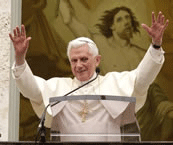ANGELUS
H.H. Benedict XVI
"On the First Sunday of Lent"
February 17, 2013
www.zenit.org
Dear brothers and sisters!
Last Wednesday, with the traditional distribution of ashes, we entered into Lent, a time of conversion and penance in preparation for Easter. The Church, who is mother and teacher, calls all of her members to renew themselves spiritually, to reorient themselves toward God, renouncing pride and egoism to live in love. In this Year of Faith Easter is a favorable time to rediscover faith in God as a basic criterion for our life and the life of the Church. This always means a struggle, a spiritual combat, because the evil spirit naturally opposes our sanctification and seeks to turn us away from the path to God. That is why each year on the first Sunday of Lent the Gospel narrative of Jesus’ temptation in the desert is proclaimed.
Jesus, in fact, after having received “investiture” as Messiah – “anointed” with the Spirit – at the baptism in the Jordan, was led by the same Spirit into the desert to be tempted by the devil. At the beginning of his public ministry Jesus had to unmask and reject the false images of the Messiah that the tempter proposed to him. But these temptations are also false images of man, which always harass our conscience, disguising themselves as suitable, effective and even good proposals. The evangelists Matthew and Luke present 3 temptations of Jesus, differing in part only in the order. The nucleus of these temptations always consists in instrumentalizing God for our own interests, giving more importance to success or to material goods. The tempter is clever: he does not direct us immediately towar evil but toward a false good, making us believe that power and things that satiate primary needs are what is most real. In this manner God becomes secondary; he is reduced to a means, he becomes unreal, he no longer counts, he disappears. In the final analysis, faith is what is at stake in temptations because God is at stake. In the decisive moments of life and, in fact, in every moment of life, we are faced with a choice: do we want to follow the “I” or God? Do we want to follow individual interest or rather the true Good, that which is really good?
As the Fathers of the Church teach us, temptations are of Jesus’ “descent” into our human condition, into the abyss of sin and its consequences. A “descent” that Jesus undertook to the very end, to the point of death on the cross and the descent into the netherworld (inferi) of extreme distance from God. In this way he is the hand of God extended to man, to the lost sheep, to bring back him to safety. As St. Augustine teaches, Jesus has taken temptations from us to give us his victory (cf. Enarr. in Psalmos, 60,3: PL 36, 724). Therefore, we too are not afraid to face combat with the evil spirit: the important point is that we do it with him, with Christ, the Victor. And to stand with him we turn to the Mother, Mary: let us invoke her with filial confidence in the hour of trial, and she will make us feel the powerful presence her divine Son, to reject the temptations with the Word of Christ, and so to put God once again at the center of our life.
[Following the recitation of the Angelus the Holy Father greeted those present in various languages. In English he said:]
I greet all the English-speaking visitors and pilgrims present for today’s Angelus. Today we contemplate Christ in the desert, fasting, praying, and being tempted. As we begin our Lenten journey, we join him and we ask him to give us strength to fight our weaknesses. Let me also thank you for the prayers and support you have shown me in these days. May God bless all of you!
[Concluding in Italian, the Holy Father said:]
I wish everyone a good Sunday and a good Lenten journey. This evening I will begin a week of retreat: let us be united in prayer. Have a good week everyone. Thank you!
(February 17, 2013) © Innovative Media Inc.
| H.H. Benedict XVI-Angelus |

